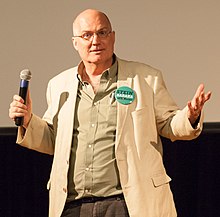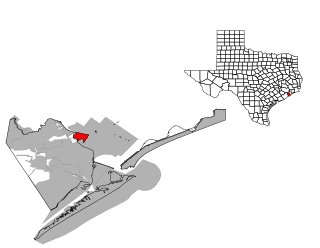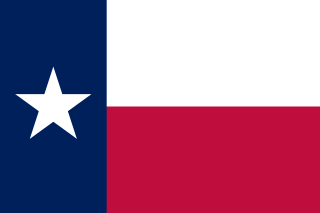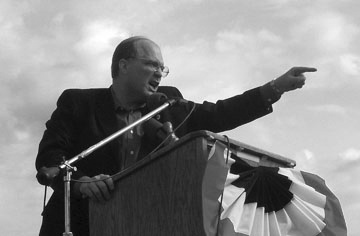
The Peace and Freedom Party (PFP) is a left-wing political party with affiliates and former members in more than a dozen American states, including California, Colorado, Florida, Hawaii, Indiana and Utah, but none now have ballot status besides California. Peace and Freedom's first candidates appeared on the ballot in 1966 in New York. The Peace and Freedom Party of California was organized in early 1967, gathering over 103,000 registrants which qualified its ballot status in January 1968 under the California Secretary of State Report of Registration.

Michael J. Badnarik is an American software engineer, political figure, and former radio talk show host. He was the Libertarian Party nominee for President of the United States in the 2004 elections, and placed fourth in the race, behind independent candidate Ralph Nader and the two major party candidates, George W. Bush and John Kerry. Two years later Badnarik ran as a Libertarian Party candidate in the 2006 congressional elections for Texas's 10th congressional district seat near Austin. In a three candidate field, Badnarik came in third, receiving 7,603 votes for 4.3% of the vote.
The United States presidential election debates were held in the 2004 presidential election. Three debates were held between Republican incumbent George W. Bush and Democratic candidate John Kerry, the major candidates, and one debate was held with their vice presidential running mates, incumbent Dick Cheney and John Edwards. All four debates were sponsored by the non-profit Commission on Presidential Debates (CPD), which has organized presidential debates since its establishment in 1987.

The 2004 presidential campaign of Ralph Nader, political activist, author, lecturer and attorney began on February 23, 2004. He ran for the United States presidency in the 2004 election, as he also had in several previous elections. In 1996 and 2000, Nader was the candidate of the Green Party; in the 2004 election, however, he ran as an independent candidate. Nader won the 2002 endorsement of the Reform Party USA, and thus appeared on the ballot as the Reform Party candidate in several states. In some states, Nader was on the ballot as an independent candidate, while in other states, Nader was deemed not to have met the requirements for ballot access. In Delaware, Nader accepted the endorsement of the Independent Party of Delaware on August 15. In New York Nader was nominated by the Independence Party at their party convention, and also appeared on the ballot under the Peace and Justice Party ballot lines.
The 2004 Libertarian National Convention was held from May 28 to May 31, 2004 at the Marriott Marquis Hotel in Atlanta, Georgia. The delegates at the convention, on behalf of the U.S. Libertarian Party, nominated Michael Badnarik for the presidency and Richard Campagna for the vice-presidency in the 2004 presidential election. The convention was televised nationally on C-SPAN.
The Green Party of Oklahoma was formed in 2002 through a gradual coalition of various state green groups. It received its accreditation from the Green Party of the US in May 2005. It is also partnered with the European Federation of Green Parties and the Federation of Green Parties of the Americas. Its stated aims are a commitment to environmentalism, non-violence, social justice, and grassroots support.
The Green National Convention is the Presidential nominating convention of the Green Party of the United States (GPUS). Though the Green National Committee meets annually in a "national meeting", the convention is convened by the GNC once every four years in order to nominate an official candidate in the upcoming U.S. Presidential election, and to officially adopt the party platform and rules for the election cycle.
The Green Party is a United States political party. It has its origins dating back to 1984, when 62 people from around the U.S. came to St. Paul, MN to found the first national Green organization - the Committees of Correspondence. Since then, U.S. Greens have gone through several evolutions, from debating theory and praxis in the 1980s, to starting state parties in the 1990s, to the founding of a national political party in the 2000s.
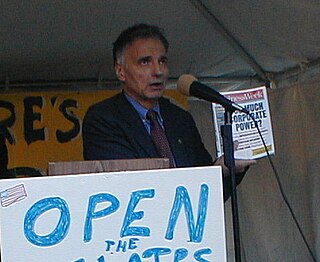
The 2000 presidential campaign of Ralph Nader, political activist, author, lecturer and attorney, began on February 21, 2000. He cited "a crisis of democracy" as motivation to run. He ran in the 2000 United States presidential election as the nominee of the Green Party. He was also nominated by the Vermont Progressive Party and the United Citizens Party of South Carolina. The campaign marked Nader's second presidential bid as the Green nominee, and his third overall, having run as a write-in campaign in 1992 and a passive campaign on the Green ballot line in 1996.
The 2004 presidential campaign of Michael Badnarik, software engineer and candidate for the Texas legislature in 2000 and 2002, began on February 17, 2003, three months after starting an exploratory committee on November 17, 2002. He spent over a year traveling the country, totaling over 25,000 miles prior to the 2004 Libertarian National Convention. On the second night of the Convention, he participated in a debate with the other Libertarian candidates, broadcast on C-SPAN.
The Green Party of Rhode Island (GPRI) is one of the oldest active Green parties in the United States. The party was founded on March 6, 1992, at a meeting of 40 activists from Rhode Island. In November 1996, GPRI was one of 12 founding parties in the Association of State Green Parties, renamed the Green Party of the United States in 2001. Several Rhode Island party leaders have served as officers of the national Green Party. The party's candidates run for municipal councils in several cities and towns, such as running for Mayor of Providence, the State Senate and the State House of Representatives, U.S. Congress, and for Lieutenant governor. The Green Party of Rhode Island has been involved in nationwide Green politics.

The 2004 national convention of the Green Party of the United States was held at the Hyatt Regency and the Midwest Center in Milwaukee, Wisconsin on June 23–28, 2004.

The 2004 presidential campaign of David Cobb, a Texas attorney, was Cobb's second overall election campaign, having run for State Attorney General in 2002. Prior to seeking the presidential nomination of the Green Party of the United States, he was involved with Ralph Nader's campaign in 2000 and was an activist for the Green Party.
The Libertarian Party of the United States was formed in Colorado Springs in the home of Luke Zell by a group of individuals led by David Nolan on December 11, 1971, after several months of debate among members of the Committee to Form a Libertarian Party, founded July 17. The formation was prompted in part by price controls and the end of the Gold Standard implemented by President Richard Nixon. The Libertarian Party viewed the dominant Republican and Democratic parties as having diverged from what they viewed as the libertarian principles of the American Founding Fathers. This group included John Hospers, Edward Crane, Manuel Klausner, Murray Rothbard, Roy Childs, Theodora (Tonie) Nathan, and Jim Dean.
The Iowa Green Party is the Iowa-affiliate of the Green Party of the United States (GPUS). The 2013 Annual Meeting of the GPUS was held at the Iowa Memorial Union in Iowa City, Iowa.

The 2016 Green Party presidential primaries were a series of primaries, caucuses and state conventions in which voters elected delegates to represent a candidate for the Green Party's nominee for President of the United States at the 2016 Green National Convention. The primaries, held in numerous states on various dates from January to July 2016, featured elections publicly funded and held as an alternative ballot, concurrent with the Democratic and Republican primaries, and elections privately funded by the Green Party, held non-concurrently with the major party primaries. Over 400 delegates to the Green National Convention were elected in these primaries, with a candidate needing a simple majority of these delegates to become the party's nominee for president.
